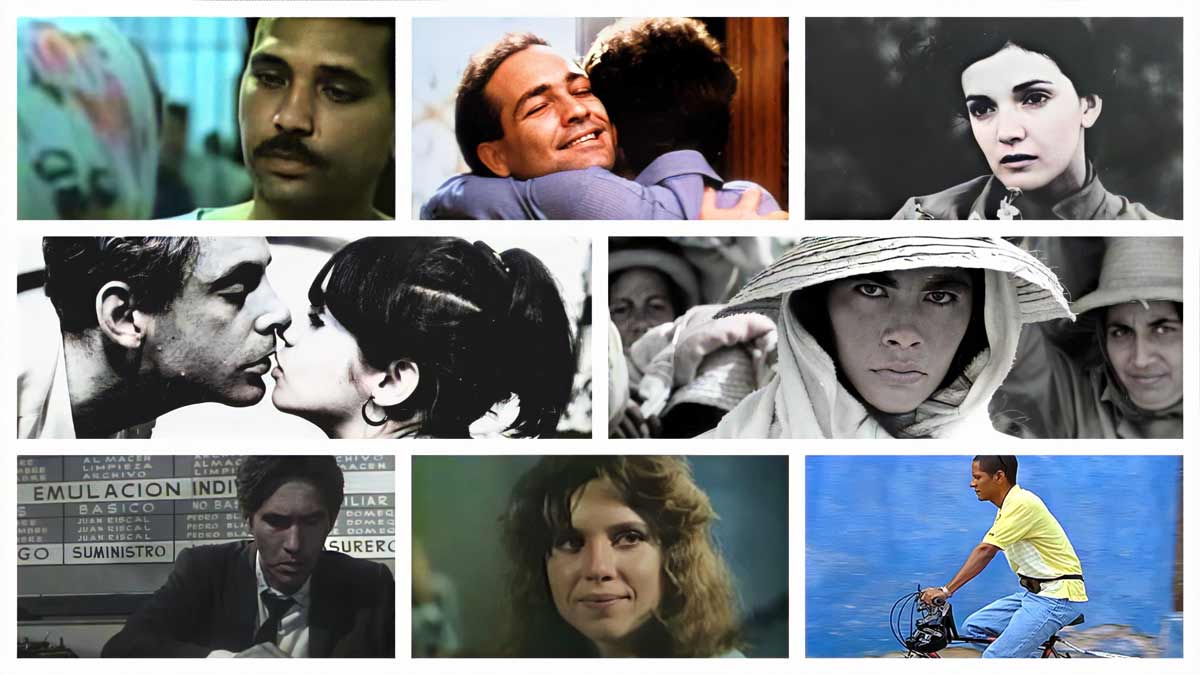The 10 best Cuban movies of all time

Cinema arrived in Cuba in the early 20th century but reached its peak in the decade from 1959 to 1969. Those years are known as the golden age of Cuban cinema.
There is a list of Cuban films that remain indelible in the collective memory of the nation. It is an extensive list that has earned a space in popular culture and in the mentality of the island’s inhabitants, whether for dealing with pressing issues of Cuban society, for unforgettable performances or for making us laugh or cry with Cuban humor or tragedy.
Making a selection of the best films of Cuban cinema is quite complicated. Any list does not escape the subjectivity of the person making the selection. Even so, we take the risk of listing those classics of Cuban cinema that you must see immediately if you want to know a little more about Cuban history and culture.
Ready… action!
Memories of Underdevelopment (1968)
Memories of Underdevelopment, by director Tomás Gutiérrez Alea, is the Cuban film par excellence. The film that does not escape any list of recommendations on Cuban cinema. So many years after its release, it is still not only one of the best Cuban films, but also one of the best films in Ibero-America.
The main achievement of the feature film was to show a revolutionary Cuban intellectual as a critical and reflective spectator of the changes in the cultural and social reality of the island that Fidel Castro’s Revolution brought about.
Strawberry and Chocolate (1993)
Another Cuban film that also ranks among the classics of our cinema is Strawberry and Chocolate, by directors Tomás Gutiérrez Alea and Juan Carlos Tabío.

The film is an incisive critique of intolerance towards homosexuality in Cuba in the 70s and 80s. The performances, the winking humor and the spaces where the film takes place, made the Cuban public like it very much.
Who doesn’t remember the funny line “Oops, a strawberry! Today is my lucky day”?
Strawberry and Chocolate was the first Cuban film to be nominated for an Oscar and has won several awards and prizes at international festivals.
Death of a Bureaucrat (1966)
What does a Cuban film need to make us fall in love with it? A critique in the key of Creole humor! And that was the resource exploited by Tomás Gutiérrez Alea in Death of a Bureaucrat.
Paco’s death in a work accident and the “brilliant” idea of burying him with his work card triggers a whole series of tragicomic events when his widow needs the card to claim his pension. The icing on the cake? An absurd bureaucracy that complicates everything.
The film is a critique of bureaucracy, one of the most common evils of the socialist experiments in Eastern Europe and also in Cuba.
Lucia (1968)
Raquel Revuelta, Eslinda Núñez and Adela Legrá, three Lucías, three historical moments, made this film an icon of Cuban cinema.

Each Lucía and her historical circumstance become protagonists of three periods of Cuban history: the War of Independence, the struggle against dictator Gerardo Machado and the first years of the 1959 Revolution.
By director Humberto Solás, Lucía is one of the most anthological films of the national production and has received numerous national and international awards.
The Survivors (1979)
With that title and this phrase “I don’t care if capitalism, socialism… or feudalism returns. What you have to know is how to turn the system around…”, it is not very difficult to imagine what Tomás Gutiérrez Alea’s film Los supervivientes is about.
The triumph of the Revolution and a well-to-do Cuban bourgeois family that wants to preserve its status at all costs form the backbone of this blackly humorous film. The great performances of Enrique Santiesteban, Reinaldo Miravalles, Vicente Revuelta, Carlos Ruiz de la Tejera, Ana Viñas and Germán Pinelli stand out.
For many critics and viewers, The Survivors is the best Cuban film of all time, but there are discussions about it. It is undoubtedly one of the best.
Vampires in Havana (1987)
Vampires in Havana, by director Juan Padrón, is one of the best of the golden decade of Cuban cartoons. And no, it’s not a horror movie, quite the opposite.
Those vampires will make you laugh out loud in their struggle, in the best gangster style, to get their hands on vampisol, a magic formula to protect vampires from sunlight.

If you want to know Cuban humor at its best, you must see Vampires in Havana.
The beauty of the Alhambra (1989)
The film is a portrait of the 1920s in Havana, a city of cabarets and vedettes. La bella del Alhambra is one of the most remembered Cuban musical films. A flirtatious Beatriz Valdés singing made thousands of Cuban grandparents sigh with love and desire.
The feature film mixes drama, musical, parody, spectacle. All well united under the direction of Enrique Pineda Barnet to achieve a renowned musical melodrama.
Clandestinos (1987)
Directed by Fernando Pérez and set in the midst of clandestine street fighting before 1959, a convulsive period in the island’s history, this is one of the classic love stories of Cuban cinema: that of Ernesto and Nereida.
Although based on historical facts, Clandestinos is not a historical film per se, but is closer to the thriller genre, full of action, suspense and drama.
With their performances in this film, Isabel Santos and Luis Alberto García established themselves as two of the best known and most beloved faces in the Cuban film industry.
Conducta (2014)
One of the recent Cuban films that moviegoers have liked the most is Conducta.

Directed by Ernesto Daranas, with spectacular performances by Alina Rodríguez and the child Armando Valdés Freire and a thought-provoking script, it was expected to have an excellent reception among genre lovers.
A violent and marginalized boy, raised in a poor Havana lot with an alcoholic mother, forms a strong bond with a veteran teacher who tries to save him from that marginal environment, full of illegalities and violence.
The film’s story speaks to us about current Cuban social problems, makes us cry and at the same time makes us reflect on the role of family, school and society in the education of children.
Suite Havana (2003)
Suite Havana is a Cuban documentary film directed by Fernando Perez. The film narrates a simple day in the life of 10 ordinary inhabitants of Havana.
In the film there are no interviews, no dialogues, no narration. Only images, sounds and music are used to artistically express an ordinary day in the midst of the harsh Cuban reality of the 1990s, a time when the country experienced a terrible economic crisis.
Each character in the film reflects the diversity of social groups that move in the city. The film tries to make visible those hidden characters that are so common in Cuba.







